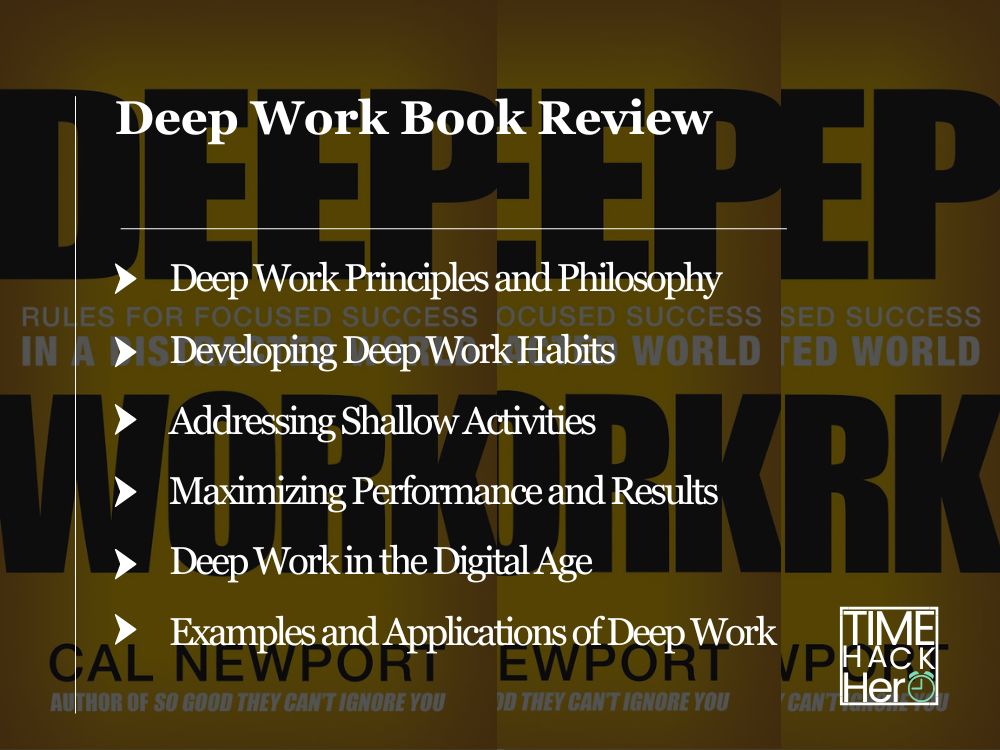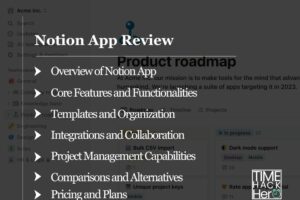In today’s fast-paced and technology-driven world, distractions are at an all-time high, making the art of deep focus increasingly important for success. Cal Newport’s book, “Deep Work: Rules for Focused Success in a Distracted World,” addresses this challenge head-on, providing readers with valuable insights and practical advice on how to cut through distractions and optimize productivity. The central theme of the book revolves around the concept of deep work – the ability to focus on cognitively demanding tasks without interruption, thus producing high-quality results at speed.
Newport organizes the book into two main sections, with the first section emphasizing the importance and necessity of deep work for a fulfilling and productive life. Through various examples, Newport demonstrates how the current distracted state of work prevents knowledge workers from achieving their full potential. He makes a compelling case for the need to reorient one’s approach to work and cultivate the deep work skill set.
The second section of the book offers readers practical advice on creating and maintaining a deep work routine. This includes tips on handling time management, embracing boredom, and developing an environment conducive to focused success. By cultivating the ability to perform deep work, professionals can unlock their potential and succeed in the competitive and constantly evolving modern world.
Table of Contents
Deep Work Principles and Philosophy
Deep Work Hypothesis
The central idea of Deep Work is that by focusing on cognitively demanding tasks without distractions, individuals can significantly increase their productivity and output. Cal Newport, the author, puts forward the hypothesis that engaging in deep work can lead to better professional results and success in one’s career.
Professional Activities and Focus
Newport explains the concept of deep work through the following principles:
- Engaging in tasks that require intense focus and sustained attention.
- Prioritizing and directing energy toward high-value activities.
- Eliminating distractions and creating an environment conducive to deep work.
- Cultivating the discipline needed to engage in deep work consistently.
By achieving these principles, individuals can transform their professional lives and reach elite levels of productivity and effectiveness.
Cognitive Capabilities
Deep work entails pushing one’s cognitive capabilities to the limit, allowing professionals to produce their best, highest quality work. The book highlights that people’s innate ability to concentrate intensely is a skill, and like any other skill, it can be developed, refined, and strengthened with practice.
Philosophy of Deep Work
Newport offers different philosophies of deep work that can be adapted based on individual preferences and work styles:
- Monastic Philosophy: Completely isolating oneself from distractions, such as social media and digital communication, to focus solely on deep work.
- Bimodal Philosophy: Dividing time between intense periods of deep work and regular work, with the minimum unit of time for deep work being one full day.
- Rhythmic Philosophy: Creating a daily routine that incorporates dedicated time for deep work, focusing on consistency and habit-building.
- Journalistic Philosophy: Adapting to the demands of one’s schedule by fitting in deep work sessions wherever and whenever possible.
By employing one or a combination of these philosophies, professionals can cultivate the habits and routines necessary to incorporate deep work into their daily lives, ultimately leading to a more focused, productive, and valuable professional experience.
Developing Deep Work Habits
Training Your Focus
To cultivate deep work habits, it is essential to train your focus. This requires building the skill of concentration, which takes time and practice. Start by setting specific goals for your focus sessions and gradually increasing the duration of these sessions. Consistently practicing this method will help you enhance your ability to concentrate intensely.
Scheduling Deep Work Sessions
Another critical aspect of developing deep work habits is scheduling dedicated sessions for deep work. Allocate specific time slots in your daily or weekly routine for these sessions. This will ensure you have uninterrupted periods of time to engage in focused, meaningful work. When scheduling, consider committing to these sessions as non-negotiable appointments, ensuring other tasks or distractions don’t intrude on this valuable time.
Creating a Distraction-Free Environment
A distraction-free environment is crucial for deep work. To create such an environment:
- Identify potential distractions and eliminate them from your workspace.
- Adjust your workspace to minimize visual or auditory distractions.
- Consider using productivity tools or apps to block distracting websites or applications.
- Set your devices to “Do Not Disturb” mode during deep work sessions.
Meditation and Willpower
Meditation can be a powerful tool to improve your willpower and develop deep work habits. Regular meditation practice helps you enhance your ability to focus, ignore distractions, and maintain emotional balance. You can start with simple mindfulness exercises and gradually progress to more advanced meditation techniques as you become more comfortable with the practice.
In summary, developing deep work habits requires training your focus, scheduling dedicated sessions, creating a distraction-free environment, and leveraging meditation as a tool to increase your willpower. Implementing these strategies will enable you to engage in deep work more effectively and maximize your productivity.
Addressing Shallow Activities
Shallow Work vs Deep Work
Shallow work refers to non-cognitively demanding tasks, often performed while distracted. These tasks usually don’t require much concentration or focus, such as responding to emails or browsing the internet. On the other hand, deep work involves professional activities performed in a state of distraction-free concentration, pushing your cognitive abilities to their limit. These efforts create new value, improve your skill, and are hard to replicate.
Email and Social Media Management
Both email and social media can be significant sources of shallow activities. To address this, consider the following strategies:
- Set dedicated time blocks for checking and responding to emails and social media. This can help prevent these activities from interrupting deep work sessions.
- Automate email filtering using rules to organize and prioritize messages. This can help minimize the time spent managing your inbox.
- Use tools like website blockers or apps that help you stay focused on your deep work task, and away from social media temptations.
- Delegate email and social media management to an assistant or team member, if possible. This allows you to focus on more cognitively demanding tasks.
Anticipating and Minimizing Distractions
Minimizing distractions is essential for maintaining the focus required for deep work. Consider the following strategies for addressing distractions:
- Create a dedicated workspace that is free from distractions and conducive to deep concentration. This might be a home office or a designated area in your workplace.
- Schedule deep work sessions during times of day when you are typically most focused and productive. Stick to this schedule as much as possible.
- Set clear expectations with family members, colleagues, or roommates about your availability during deep work sessions. This can help minimize interruptions.
- Eliminate or reduce noise distractions by using noise-cancelling headphones or playing soft background music.
By addressing shallow activities and their potential to interrupt deep work sessions, you can maximize your cognitive abilities and improve overall productivity. Implementing these strategies can help you maintain focus and concentration, allowing you to achieve success in your professional and personal endeavors.
Maximizing Performance and Results
Intensity and Deliberate Practice
One of the key concepts in the Deep Work book is deliberate practice. Deliberate practice requires high intensity, focused effort on specific, well-defined tasks that improve your skills and performance. Some tips for achieving this level of intensity include:
- Setting clear goals for each session
- Minimizing distractions such as phone notifications and background noise
- Allotting dedicated chunks of time for deep work sessions
By consistently engaging in deliberate practice, you build expertise and maximize performance in your chosen field.
Flow and Optimal Conditions
Another important aspect of deep work is achieving a state of flow. Flow is a mental state in which you are completely absorbed in your work and find yourself operating at your peak cognitive capacity. To achieve flow and create optimal conditions for deep work:
- Surround yourself with a clutter-free, organized environment
- Use the Pomodoro Technique: 25 minutes of focused work followed by a 5-minute break
- Experiment with different work routines to find the one that best suits your natural rhythms and energy levels
Developing the skill to achieve flow consistently allows you to accomplish more in less time and maintain a higher level of performance.
Managing Downtime and Boredom
Deep work is not about working relentlessly; it also emphasizes the importance of managing downtime and boredom. Downtime and breaks can boost cognitive function, allowing your mind to recharge and prepare for the next deep work session. Strategies for managing downtime and boredom include:
- Scheduling regular breaks during your deep work sessions
- Engaging in leisure activities that help you relax and recharge, such as reading, meditation, or exercise
- Embracing boredom by not constantly seeking stimulation through technology and social media
By striking a balance between focused deep work and purposeful downtime, you effectively maximize your performance and overall results.
Deep Work in the Digital Age
New Economy and Knowledge Workers
In the new economy, knowledge workers are becoming increasingly valuable. These professionals, ranging from self-help authors to computer science professors, rely heavily on their ability to maintain intense concentration and produce high-quality work. However, the constant connectivity offered by modern technology presents significant challenges to achieving this level of focus.
Constant Connectivity Challenges
The digital age has ushered in a new era of constant connectivity, where smartphones, email, and social media platforms are constantly vying for our attention. This has led to a decrease in our attention span and an increase in frenetic shallowness, making it difficult for individuals to engage in deep work. In order to overcome these distractions and cultivate a distraction-free environment, we must learn to manage our relationship with technology and prioritize focused work.
| Challenges | Solutions |
|---|---|
| Set designated email checking times | |
| Social Media | Disable notifications, create a schedule |
| Smartphones | Use apps with focus-promoting features |
Embracing Digital Minimalism
“Deep Work” by Cal Newport, a computer science professor and author, highlights the importance of embracing digital minimalism as a means to overcome constant connectivity challenges. Digital minimalism is a lifestyle philosophy in which one minimizes the use of technology, allowing for greater focus and deeper, more meaningful work. By adopting this philosophy, individuals can reclaim control over their time and attention, allowing for a more productive and fulfilling work experience.
- Key principles of digital minimalism:
- Be intentional with technology use
- Prioritize high-quality, focused work
- Limit exposure to distractions
In conclusion, by understanding the challenges posed by constant connectivity and embracing digital minimalism, professionals in the new economy can develop a work environment that fosters deep work and maximizes productivity.
Examples and Applications of Deep Work
Successful Professionals and Deep Work
Deep work can be seen in the practices of successful professionals across various industries. By focusing on cognitively demanding tasks without distractions, these individuals are able to produce high-quality work that sets them apart. Examples of deep work being applied in professional fields include:
- Researchers and scientists who focus on complex problems requiring creativity and innovation
- Writers who can produce compelling and immersive content by concentrating on their work for extended periods without interruption
- Software developers working on highly intricate and sophisticated code
So Good They Can’t Ignore You
Cal Newport’s concept of “So Good They Can’t Ignore You” emphasizes the importance of mastering a skill or craft to the point where your talent becomes undeniable. By dedicating time to deep work, individuals can achieve this level of skill and stand out in their respective fields. Some examples are:
- Musicians who spend countless hours practicing to perfect their technique
- Olympic athletes who commit to rigorous training regimens to hone their abilities
- Top-performing sales professionals who develop exceptional communication and persuasion skills through focused practice
Tips for High-Quality Work
To leverage the power of deep work, consider implementing the following strategies:
- Set clear goals: Determine what tasks require deep work and establish specific, measurable, achievable, relevant, and time-bound (SMART) goals for these tasks.
- Create a dedicated workspace: Establish a comfortable and quiet environment that facilitates focus and minimizes distractions.
- Schedule deep work sessions: Allocate dedicated time slots in your daily routine to concentrate on your deep work tasks. Avoid multitasking during these sessions.
- Limit the use of technology: Disable notifications, close unrelated tabs, or even go offline during your deep work sessions to reduce potential distractions.
- Take breaks: Schedule regular breaks in between deep work sessions to prevent burnout and maintain productivity.
Through the application of deep work practices, professionals can improve their productivity, create high-quality work, and ultimately reach the level of being “so good they can’t ignore you.”









